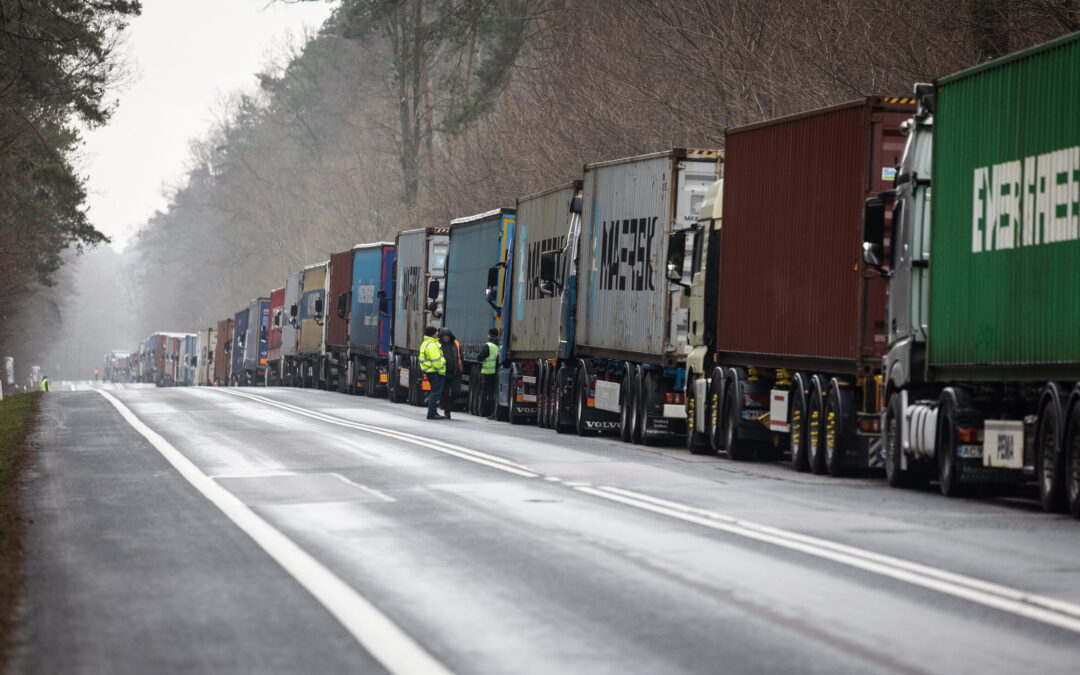Poland’s government has declared success in its efforts to persuade the European Commission to revise the deal on road transport between the European Union and Ukraine that led to weeks-long protests on the Polish-Ukrainian border last year.
In its own statement yesterday, the commission underlined that the scope of the agreement will remain the same but said that the EU will introduce safeguards to ensure that it does not cause “major disturbances” in domestic road transport markets.
📢#KomisjaEuropejska zgadza się na rewizję Umowy 🇪🇺-🇺🇦 o transporcie drogowym towarów!
✅To efekt intensywnych starań strony polskiej 🇵🇱, która konsekwentnie wskazywała, że dotychczasowe funkcjonowanie Umowy negatywnie oddziaływało na polską branżę przewozów drogowych.… pic.twitter.com/wdxpC0Y5Im
— Ministerstwo Infrastruktury (@MI_GOV_PL) March 5, 2024
Last year, truckers in Poland spent weeks blocking border crossings with Ukraine in protest against the EU’s decision, after Russia’s full-scale invasion, to make it easier for Ukrainian transport firms to operate within the bloc.
The protest was suspended in mid-January after an agreement with Poland’s government, which pledged to seek changes to EU rules, secure EU funding for transport firms, and introduce stronger enforcement of controls on the Ukraine border.
Yesterday, Poland’s infrastructure ministry announced that the “European Commission has agreed to revise the EU-Ukrainian agreement on transport of goods by road” as a “result of the intensive and multifaceted efforts by the Polish side” to demonstrate its “negative impact on the Polish road transport industry”.
“Dozens of meetings, talks and negotiations with both the European Commission and the Ukrainian side have brought results,” said the head of the ministry, Dariusz Klimczak. “We managed to convince our partners of the need to work on the revision of this agreement.”
Polish truckers who have been blocking the Ukraine border since November have suspended their protest after signing an agreement with the government.
The blockade has been halted until 1 March while the government seeks to implement the terms of the deal https://t.co/6V1LVHb98w
— Notes from Poland 🇵🇱 (@notesfrompoland) January 16, 2024
That statement followed an announcement by the European Commission itself, which said that it was “introducing updates to the agreement with Ukraine” following discussions with member states, Kyiv and other stakeholders.
“The commission has taken into account lessons learned from the implementation of the current agreement,” said Brussels. “While the scope of the agreement will remain the same, the commission proposes updates to facilitate its implementation and enforcement by the member states.”
Proposed changes include adding a new “safeguard clause” that would allow the suspension of the agreement in a specific geographical area if it causes “a major disturbance” in the local road transport market.
Other amendments include requiring drivers to carry documents showing that a transport operator is duly authorised to perform international carriage, documents certifying that an unladen operation is directly linked to a transit or bilateral operation, and fighting fraud or forgery of driver documents.
Traditional transport routes between EU, Ukraine and Moldova remain disrupted due to Russia's war of aggression.
Today, we are proposing to extend our temporary road transport agreements until at least the end of 2025 to help secure supply chains.
The agreement with Ukraine… pic.twitter.com/knp6eJfiRd
— European Commission (@EU_Commission) March 5, 2024
The European Commission’s proposal – which it wants to remain in place until at least the end of 2025 – must now be approved by the European Council, consisting of the heads of state of the EU member states.
Klimczak welcomed the development, saying that he “hopes the proposed changes will contribute to the rebalancing of the freight transport market between the EU and Ukraine and will meet the expectations of Polish transporters”.
Since the current agreement went into force in June 2022, the EU has increased imports from Ukraine by around two thirds in terms of transport volume and by around one third in terms of value.
In absolute terms, more than 300,000 additional tonnes of goods were exported to the EU each month after the agreement came into force, reported the Rzeczopospolita daily. EU exports to Ukraine, meanwhile, also increased by around 300,000 tonnes per month.
However, Polish hauliers say that due to the lower rates charged by Ukrainian companies and the lack of need to comply with EU standards, such firms carry out most of the transport.
The amount of grain imported by Poland from Russia last year doubled while the quantity from Ukraine fell by half.
However, Russian grain still constituted a small fraction – around 1.3% – of the amount imported from Ukraine https://t.co/uO6ppNt0Bm
— Notes from Poland 🇵🇱 (@notesfrompoland) March 4, 2024

Notes from Poland is run by a small editorial team and published by an independent, non-profit foundation that is funded through donations from our readers. We cannot do what we do without your support.
Main image credit: Jakub Orzechowski / Agencja Wyborcza.pl

Alicja Ptak is deputy editor-in-chief of Notes from Poland and a multimedia journalist. She has written for Clean Energy Wire and The Times, and she hosts her own podcast, The Warsaw Wire, on Poland’s economy and energy sector. She previously worked for Reuters.



















